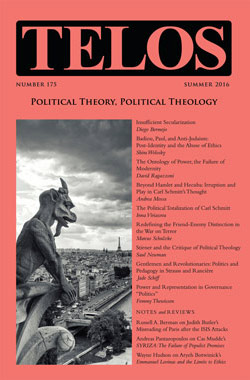For many today, Claude Lefort is a thinker known mainly by association, someone whose work emerges where others are asked to situate their projects relative to his thinking of the political. He is a prominent, if not central, figure for the more post-structuralist thinkers of radical democracy. Lefort’s sense of democracy—as that form of society where the place of power is empty—is vital to those projects that would likewise tie democracy to the symbolic character of power, and to the distinct workings of politics and the political. Interestingly, while debate over the correct translation of le or la politique seems to almost always return to Lefort, it remains the case that for his own part Lefort was never much interested in post-structuralism. For him, the post-structural turn, itself bound up with the legacies of May 1968 and the new knowledge, obfuscated almost as much as it made clear.
|
While “the political” is among the most studied aspects of Carl Schmitt’s thought, little attention has been paid to the notion of “the unpolitical,” which, I argue, plays a crucial role in understanding the totalizing status of the political. This essay, first, illuminates the symptomology of Schmitt’s political totalization; it shows how, despite its claim to autonomy, the political emerges as the total: an infinite potential that consumes human life as a whole. Second, this essay argues that the institution of political totality essentially relies upon the elimination of its radical outside—the “absolutely unpolitical.” Throughout his writings Schmitt presents the unpolitical as a merely “fictitious” reality. Meanwhile, what remains obscured is an originary event, the decision on the absolutely unpolitical, which institutes a pre-political field and thus grounds any subsequent political decision. In “On the Political: Schmitt contra Schmitt,” Benjamin Arditi is occupied with the task of revitalizing Carl Schmitt, to open or retrace various interpretative paths that allow us to use Schmitt in trajectories that he did not envisage or did not pursue. Arditi takes his reader by the hand into an exploration of a series of issues arising from Schmitt’s theory: disputes regarding the bellicose nature of the political, the identification of politics in the political, the charge of formalism, and the normative dimension of order. Consider the Aristotelian maxim that humankind “is by nature a political animal,” whose capacity for speech, unique “among the animals[,] . . . serves to reveal the advantageous and the harmful, and hence also the just and the unjust.” If one accepts this dictum (and, crucial to this article’s line of thinking, by no means must one necessarily adhere to Aristotle’s rationalist model of “man,” nor any other universalist account of humanness), then the ceaseless question remains: what specific sort(s) of speaking, morally reasoning animal might the human be read as constituting, from within the interpretive mindset of a particular historical and civilizational milieu? Of course, this question presupposes, in a manner that may well be at odds with the anthropological premises of a universalist modern political doctrine like human rights, that, rather than exhibiting a fixed, unitary essence, the human acts as a signifier; as such, this human signifier might potentially refer to myriad worldviews, and sources and assemblages of contextualizing meaning, across which the understanding of humanness can be differently constructed and construed. |
||||
|
Telos Press Publishing · PO Box 811 · Candor, NY 13743 · Phone: 212-228-6479 Privacy Policy · Data Protection Copyright © 2024 Telos Press Publishing · All Rights Reserved |
||||








